新译林牛津5A unit7 At weekends教学设计(完整资料).doc
- 格式:doc
- 大小:82.50 KB
- 文档页数:17
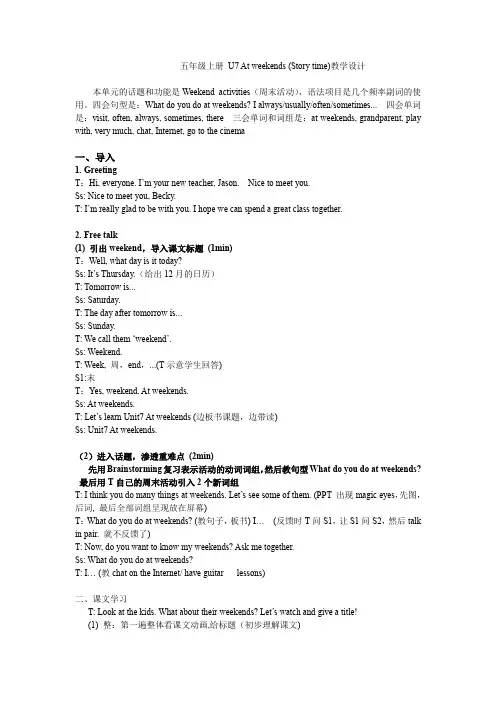
五年级上册U7 At weekends (Story time)教学设计本单元的话题和功能是Weekend activities(周末活动),语法项目是几个频率副词的使用。
四会句型是:What do you do at weekends? I always/usually/often/sometimes... 四会单词是:visit, often, always, sometimes, there 三会单词和词组是:at weekends, grandparent, play with, very much, chat, Internet, go to the cinema一、导入1.GreetingT:Hi, everyone. I’m your new teacher, Jason. Nice to meet you.Ss: Nice to meet you, Becky.T: I’m really glad to be with you. I hope we can spend a great class together.2.Free talk(1) 引出weekend,导入课文标题(1min)T:Well, what day is it today?Ss: It’s Thursday.(给出12月的日历)T: Tomorrow is...Ss: Saturday.T: The day after tomorrow is...Ss: Sunday.T: We call them ‘weekend’.Ss: Weekend.T: Week, 周,end,...(T示意学生回答)S1:末T:Yes, weekend. At weekends.Ss: At weekends.T: Let’s learn Unit7 At weekends (边板书课题,边带读)Ss: Unit7 At weekends.(2)进入话题,渗透重难点(2min)先用Brainstorming复习表示活动的动词词组,然后教句型What do you do at weekends?最后用T自己的周末活动引入2个新词组T: I think you do many things at weekends. Let’s see some of them. (PPT 出现magic eyes,先图,后词, 最后全部词组呈现放在屏幕)T:What do you do at weekends? (教句子,板书) I…(反馈时T问S1,让S1问S2,然后talk in pair. 就不反馈了)T: Now, do you want to know my weekends? Ask me together.Ss: What do you do at weekends?T: I… (教chat on the Internet/ have guitar lessons)二、课文学习T: Look at the kids. What about their weekends? Let’s watch and give a title!(1) 整:第一遍整体看课文动画,给标题(初步理解课文)T: Well, what do you think of their weekends? Use one word. (屏幕上打出:________weekends)Ss: Happy/ Wonderful/ Nice/...第二遍整体听课文录音,选出提到的周末活动(理解具体内容)T: Now, take out your worksheet. Listen again and tick the activities hear.(找学生反馈,并出示答案)(2) 分:分段学习课文T:Are you right? Who does them?Let’s learn.图1 (T教,清晰示范:1.找出Who和What;2.划出新词难词,读一读;3.联系自身说一说)T:. Well, who are they talking about?Ss: Su Hai, Su Yang and Mike.T: How do they ask? (T 再教What do you do at weekends?)(Ss学习:Su Hai & Su Yang: visit my grandparents/play with the cat/have dinner with grandparents, 同时板书词条配对)(Mike: chat on the Internet with grandparents) T: What do you do at weekends?Ss: I…图2 & 图3 (Ss仿照T图1的方法自学)(T用几个问题check自学效果)(出图2)T: Who are they talking about now?Ss: Helen.T: What does she do at weekends?Ss:She always has dancing lessons. She sometimes goes to the cinema with her friends.(出图3)同样的方法检测图3自学效果(特别注意在反馈谁干了什么的同时要将板书的词条配对,最后黑板上呈现的应当是四个头像和对应的动词词组)(出P70)让学生填,提醒可借助板书。
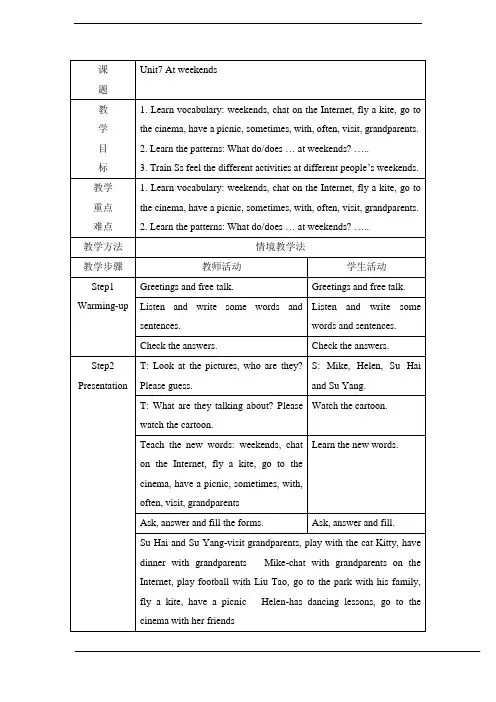
课题Unit7 At weekends教学目标1. Learn vocabulary: weekends, chat on the Internet, fly a kite, go to the cinema, have a picnic, sometimes, with, often, visit, grandparents.2. Learn the patterns: What do/does … at weekends? …..3. Train Ss feel the different activities at different people’s weekends.教学重点难点1. Learn vocabulary: weekends, chat on the Internet, fly a kite, go to the cinema, have a picnic, sometimes, with, often, visit, grandparents.2. Learn the patterns: What do/does … at weekends? …..教学方法情境教学法教学步骤教师活动学生活动Step1 Warming-up Greetings and free talk. Greetings and free talk. Listen and write some words andsentences.Listen and write somewords and sentences. Check the answers. Check the answers.Step2 Presentation T: Look at the pictures, who are they?Please guess.S: Mike, Helen, Su Haiand Su Yang.T: What are they talking about? Pleasewatch the cartoon.Watch the cartoon.Teach the new words: weekends, chaton the Internet, fly a kite, go to thecinema, have a picnic, sometimes, with,often, visit, grandparentsLearn the new words.Ask, answer and fill the forms. Ask, answer and fill.Su Hai and Su Yang-visit grandparents, play with the cat Kitty, have dinner with grandparents Mike-chat with grandparents on the Internet, play football with Liu Tao, go to the park with his family, fly a kite, have a picnic Helen-has dancing lessons, go to the cinema with her friendsTeach: What do/does … at weekends? Learn: What do/does … atweekends?Read the new vocabulary. Read the new vocabulary.Listen to the tape and notice the pronunciations and intonations. Listen to the tape and notice.Read after the tape. Read after the tape. Try to read this story. Try to read this story.Choose one kind of reading and read in groups. Choose one kind of reading and read in groups.Try to read this story. Try to read this story. Read this story together. Read this story together. Act this story. Act this story.Read in roles. Read in roles.Step3 Consolidation Make some dialogues: What do/doesXX do at weekends? XX …/s/es ….Make some dialogues:What do/does XX do atweekends? XX …/s/es ….Step4 Homework 1. Write the new vocabulary.2. Read, recite and act this story.板书设计Unit7 At weekendsSu Hai and Su Yang- visit grandparents, play with the cat Kitty, have dinner with grandparentsMike-chat with grandparents on the Internet, play football with Liu Tao, go to the park with his family, fly a kite, have a picnicHelen-has dancing lessons, go to the cinema with her friends课前准备cards, pictures, tape,recorder课后小结课题Unit7 At weekends教学目标1. Learn the vocabulary: fly-flies, go-goes2. Learn the patterns: What do/does XX do at weekends? XX sometimes/often …/s/es ….3. Learn the third person singular in the sentences.教学重点难点1. Learn the patterns: What do/does XX do at weekends? XX sometimes/often …/s/es ….2. Learn the third person singular in the sentences.教学方法操练教学法教学步骤教师活动学生活动Step1 Warming-up Greetings and free talk. Greetings and free talk. Listen and write some words Listen and write. Check the answers. Check the answers. Read and act this story. Read and act this story.Step2 Presentation Look at the pictures. Look at the pictures.Talk about the pictures and thesentences.Talk about the pictures andthe sentences.Look and write. Look and write.Check the answers: Check the answers.I usually play football with Liu Tao at weekends. I also chat with my grandparent on the Internet. I sometimes fly a kite and have a picnic with my family.Su Yang and I usually visit our grandparents at weekends. We play with their cat Kitty. We have dinner with our grandparents.I always have dancing lessons at weekends. I sometimes go to the cinema with my friends.Read and write the sentences. Read and write.Read the sentences. Read the sentences.Teach the new words :goes, flies Learn the new words.Teach the third person singular in the sentences. Learn the third person singular in the sentences.Complete the grammar. Complete the grammar.Teach the different words: always, usually, often, sometimes Learn the different words: always, usually, often, sometimesLook at the pictures and talk about the pictures and the sentences. Look at pictures and talk about them and sentences.Play a game “Ask and answer”Play a game. Check the answers. Check the answers.Step3 Consolidation Read and write the sentences. Read and write.Make some dialogues: What do/doesXX do at weekends? ….Make some dialogues.Make some sentences with the thirdperson singular.Make some sentences withthe third person singular.Step4 Homework 1. Copy and write some sentences..2. Describe the activities of the weekends.板书设计Unit7 At weekendsWhat do you do at weekends? I ….they Theydoes he He …s/es ….she She …s/es ….fly-flies go-goes课前准备cards, pictures, tape,recorder课后小结课题Unit7 At weekends教学目标1. Learn the vocabulary: rose, grow, get out.2. Learn the phonetic of the letter “s”.3. Learn the patterns: Let’s go …. He/She ……s/es ….4. Train Ss enjoy the great fun of this cartoon story.教学重点难点1. Learn the vocabulary: rose, grow, get out.2. Learn the phonetic of the letter “s”.3. Learn the patterns: Let’s go …. He/She ……s/es ….教学方法谈话教学法教学步骤教师活动学生活动Step1 Warming-up Greetings and free talk. Greetings and free talk. Listen and write some sentences. Listen and write. Check the answers. Check the answers.Step2 Presentation Look at the pictures. Look at the pictures. Listen to the tape. Listen to the tape.Find the same letter “s”. Find the same letter “s”. Say the phonetic /z/ of the letter “s”. Say the phonetic /z/. Teach the new words: rose-roses,grow-growsLearn the new words:rose-roses, grow-grows Read the short text. Read the short text.Act the short text. Act the short text.Find the other words. Find the other words.Do some exercises. Do some exercises. Check the answers: Check the answers.T: Look at the pictures, who are they? S: They’re Billy, Sam andBobby.T: What are they doing? Watch thecartoon, please.Watch the cartoon.Ask, answer and fill the forms: Ask, answer and fill.Billy-watch TV, eat a lot, don’t like playing basketball and swimming, can’t get outSam and Bobby-play basketball, go swimming, go and have a picnicListen to the tape and notice the pronunciations and intonations. Listen to the tape and notice.Teach the new word: get out Learn new word. Read after the tape. Read after the tape.Choose one kind of reading and read in groups. Choose one kind of reading and read in groups.Read this cartoon story together. Read this cartoon together. Act this cartoon story. Act this cartoon story. Teach the learning tip. Learn the tip.T: What about this cartoon story? S: ….Step3 Consolidation Make some sentences with the thirdperson singular.Make some sentences withthe third person singular.Step4 Homework 1. Write some vocabulary and patterns.2. Read, recite and act this cartoon story.板书设计Unit7 At weekendsrose-roses grow-grows get outw-/w/Let’s go …. He/She …s/es ….课前准备cards, pictures, tape,recorder课后小结课题Unit7 At weekends教学目标1. Learn the vocabulary: popular.2. Learn the different ball cultures in different countries.3. Review the vocabulary and patterns of this unit.4. Appraise the harvest of this unit.教学重点难点1. Learn the vocabulary: popular.2. Learn the different ball cultures in different countries.3. Review the vocabulary and patterns of this unit.教学方法复习教学法教学步骤教师活动学生活动Step1 Warming-up Greetings and free talk. Greetings and free talk. Do some exercises of the letter “s”. Do some exercises. Check the answers. Check the answers.Step2 Presentation Look at the pictures. Look at the pictures.Talk about the pictures. Talk about the pictures. Listen to the tape. Listen to the tape.Teach the new words: popular Learn the new words:popularRead the short text. Read the short text.Act the short text. Act the short text.Teach the different ball cultures indifferent countries.Learn the different ballcultures in differentcountries.Look at the pictures. Look at the pictures.Talk about the pictures and sentences. Talk about the pictures andsentences.Ask, choose and say. Ask, choose and say. Check the answers. Check the answers.Look at the pictures. Look at the pictures.Talk about the pictures and sentences. Talk about the pictures andsentences.Think and write. Think and write.Check the answers: Check the answers.I usually do homework at weekends. I often play football. I sometimes watch TV. My friend XX always does homework at weekends. He/She usually has skating lessons. He/She sometimes goes to the cinema.Read and write the sentences. Read and write.Review this unit. Review this unit.Say the rules of it. Say the rules of it. Appraise the harvest of this unit. Appraise the harvest. Total the stars. Total the stars.Step3 Consolidation Make some dialogues: This is myfriend. He/She ……s/es ….Make some dialoguesStep4 Homework 1. Recite the vocabulary and patterns.2. Finish the workbooks.板书设计Unit7 At weekends Basketball is popular in the US.Football is popular in the UK.Table tennis is popular in China.课前准备cards, pictures, tape,recorder课后小结。
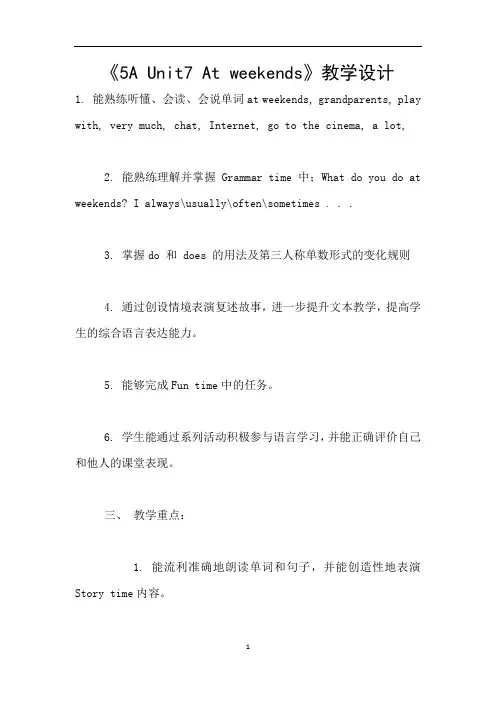
《5A Unit7 At weekends》教学设计1. 能熟练听懂、会读、会说单词at weekends, grandparents, play with, very much, chat, Internet, go to the cinema, a lot,2. 能熟练理解并掌握Grammar time中;What do you do at weekends? I always\usually\often\sometimes . . .3. 掌握do 和 does 的用法及第三人称单数形式的变化规则4. 通过创设情境表演复述故事,进一步提升文本教学,提高学生的综合语言表达能力。
5. 能够完成Fun time中的任务。
6. 学生能通过系列活动积极参与语言学习,并能正确评价自己和他人的课堂表现。
三、教学重点:1. 能流利准确地朗读单词和句子,并能创造性地表演Story time内容。
2. 能熟练认读理解,运用单词和句型What do you do at weekends? I always\usually\often\sometimes . . .四、教学难点:根据所描述的对象正确运用句型。
五、教学过程:Step1. Warm up1.Greetings2.Look,say and shout3.Retell the storyStep2.Presentation1.Ask and answerWhat about you?What do you do at weekends?What does he/she do at weekends?导入,操练句型A:What do you do at weekends?B:I…A:What does he/she do at weekends?B:He/She…(s)…总结动词原形转换成第三人称单数动词形式的规则 2.呈现并巩固,用所给单词的适当形式填空。
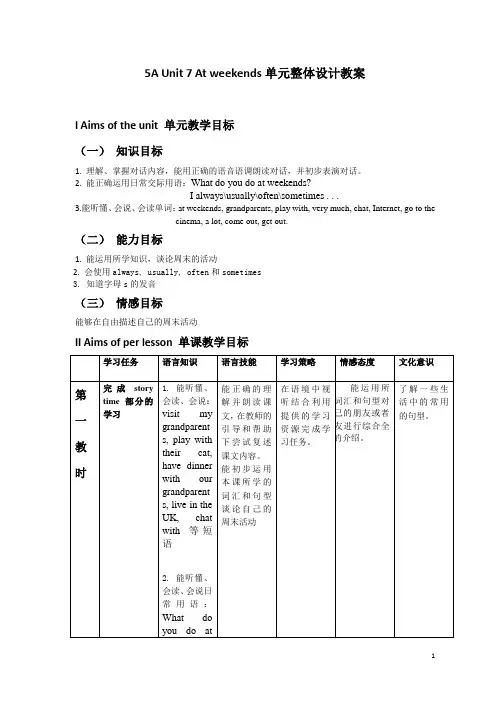
5A Unit 7 At weekends单元整体设计教案I Aims of the unit 单元教学目标(一)知识目标1. 理解、掌握对话内容,能用正确的语音语调朗读对话,并初步表演对话。
2. 能正确运用日常交际用语:What do you do at weekends?I always\usually\often\sometimes . . .3.能听懂、会说、会读单词:at weekends, grandparents, play with, very much, chat, Internet, go to thecinema, a lot, come out, get out.(二)能力目标1. 能运用所学知识,谈论周末的活动2. 会使用always, usually, often和sometimes3. 知道字母s的发音(三)情感目标能够在自由描述自己的周末活动II Aims of per lesson 单课教学目标III Discourses of the unit 单元文本内容Story time:Mike: What do you do at weekends, Su Hai?Su Hai : I usually visit my grandparents. Su Yang and I like playing with their cat Kitty very much. We often have dinner with our grandparents at weekends.Mike: My grandparents live in the UK. I usually chat with them on the Internet at weekends.Su Hai: What does Helen do at weekends?Mike: She always has dancing lessons. She sometimes goes to the cinema with her friends.Su Hai: What about you, Mike?Mike: I usually play football with Liu Tal at weekends. I some times go to the park with my family. We usually fly a kite and have a picnic there.Cartoon time:Billy always watches TV at weekends. He always eats a lot too.Billy: Mmm, nice!It is spring. Sam and Bobby often play basketball.Bobby: Come out and play basketball, Billy!Billy: No. I don’t like playing basketball.Summer comes. Sam and Bobby often go swimming.Sam: Let’s go swimming, Billy!Billy: No. I don’t like swimming.Now it is autumn.Sam: Let’s go and have a picnic, Billy.Billy: Sure! I like picnics!Billy is too fat.Billy: Oh, I can’t get out!IV Aids 教学准备: Discourse , pictures,videoV Teaching procedure of Period 1 分课时教案教学日期__________Teaching procedure of Period 2 分课时教案教学日期__________Teaching procedure of Period 3 分课时教案教学日期__________Teaching procedure of Period 4 分课时教案教学日期__________Teaching procedure of Period 5 分课时教案教学日期__________Teaching procedure of Period 6分课时教案教学日期__________Teaching procedure of Period 7分课时教案教学日期__________Teaching procedure of Period 8分课时教案教学日期__________。
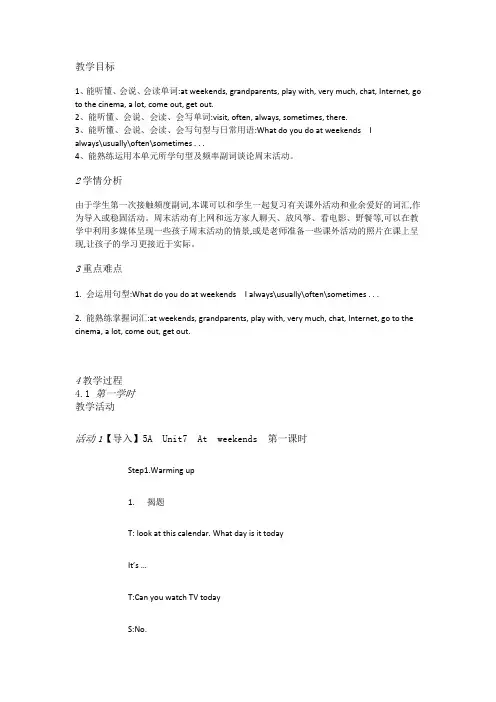
教学目标1、能听懂、会说、会读单词:at weekends, grandparents, play with, very much, chat, Internet, go to the cinema, a lot, come out, get out.2、能听懂、会说、会读、会写单词:visit, often, always, sometimes, there.3、能听懂、会说、会读、会写句型与日常用语:What do you do at weekends Ialways\usually\often\sometimes . . .4、能熟练运用本单元所学句型及频率副词谈论周末活动。
2学情分析由于学生第一次接触频度副词,本课可以和学生一起复习有关课外活动和业余爱好的词汇,作为导入或稳固活动。
周末活动有上网和远方家人聊天、放风筝、看电影、野餐等,可以在教学中利用多媒体呈现一些孩子周末活动的情景,或是老师准备一些课外活动的照片在课上呈现,让孩子的学习更接近于实际。
3重点难点1. 会运用句型:What do you do at weekends I always\usually\often\sometimes . . .2. 能熟练掌握词汇:at weekends, grandparents, play with, very much, chat, Internet, go to the cinema, a lot, come out, get out.4教学过程4.1 第一学时教学活动活动1【导入】5A Unit7 At weekends 第一课时Step1.Warming up1. 揭题T: look at this calendar. What day is it todayIt’s …T:Can you watch TV todayS:No.S:We need to school.We have no time.T:When can you watch TVS:We can watch TV on Saturdays and Sundays.T:Yes,Saturdays and Sundays are the end of the week,we call them weekends. (教weekends). Do you come to school on Saturdays and SundaysS:No,I don’t.T:So you don’t need to come to school“at weekends〞. (出示词组)Let’s read: Unit 7 At weekends.2.T:A: What do you do at weekendsB: I … at weekends.A: What does he/she do at weekendsB: He/ She …s at weekends.Step2:Presentation1.T:I know something about your weekends.Do you want to know what do I do at weekends (出示问题)S:Yes.T:Now I do you guess and you can ask:Do you ...at weekends OKT:Now,look carefully.(做看书的动作)S:Do you read books at weekendsT:Yes,you’re right.(板书read books)I read books every day,so Ican say I always read books.(教always)What do you always do at weekendsS:I…T:Good,now let’s go on(做敲门拜访祖父母的动作)Hi,grandma.S:Do you visit your grandparentsT:Great.I visit my grandparents .(教授visit.板书visit grandparents)请生读。
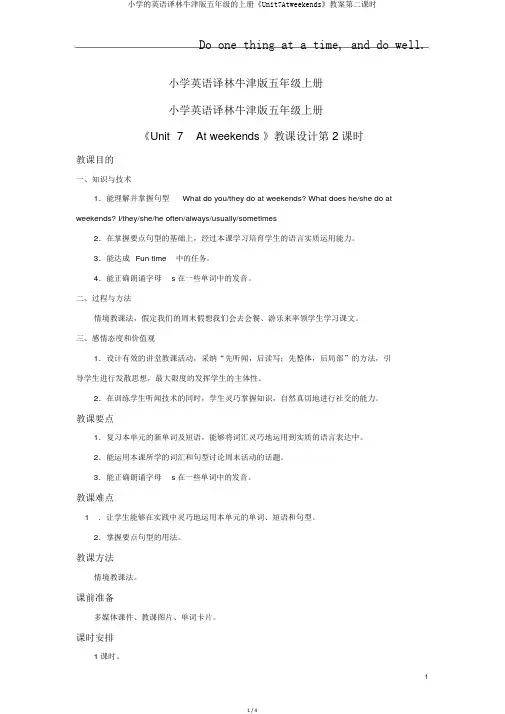
Do one thing at a time, and do well.小学英语译林牛津版五年级上册小学英语译林牛津版五年级上册《Unit 7 At weekends 》教课设计第 2 课时教课目的一、知识与技术1.能理解并掌握句型What do you/they do at weekends? What does he/she do at weekends? I/they/she/he often/always/usually/sometimes2.在掌握要点句型的基础上,经过本课学习培育学生的语言实质运用能力。
3.能达成Fun time中的任务。
4.能正确朗诵字母s 在一些单词中的发音。
二、过程与方法情境教课法,假定我们的周末假想我们会去会餐、游乐来率领学生学习课文。
三、感情态度和价值观1.设计有效的讲堂教课活动,采纳“先听闻,后读写;先整体,后局部”的方法,引导学生进行发散思想,最大限度的发挥学生的主体性。
2.在训练学生听闻技术的同时,学生灵巧掌握知识,自然真切地进行社交的能力。
教课要点1.复习本单元的新单词及短语,能够将词汇灵巧地运用到实质的语言表达中。
2.能运用本课所学的词汇和句型讨论周末活动的话题。
3.能正确朗诵字母s 在一些单词中的发音。
教课难点1.让学生能够在实践中灵巧地运用本单元的单词、短语和句型。
2.掌握要点句型的用法。
教课方法情境教课法。
课前准备多媒体课件、教课图片、单词卡片。
课时安排1课时。
教课过程一、导入新课Step1. Warming up.(热身活动)1.Sing an English song.2.Free talk.Step 2. Presentation(新课表现)游戏:摘果实。
1. 教师把词组:“ at weekends, chat on the Internet,fly a kite, go to the cinema, have a picnic, very much”以及句子“What do you/they do at weekends? What does he/she do at weekends?”“ I/they/she/he often/usually/always/sometimes”用卡片的形式贴在黑板上。
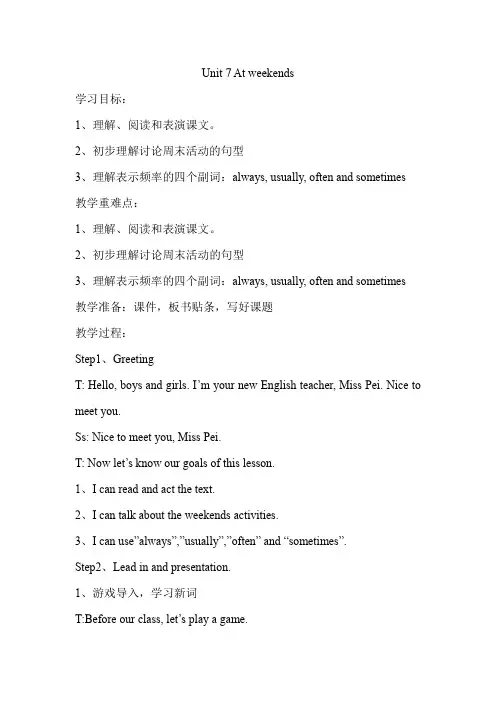
Unit 7 At weekends学习目标:1、理解、阅读和表演课文。
2、初步理解讨论周末活动的句型3、理解表示频率的四个副词:always, usually, often and sometimes教学重难点:1、理解、阅读和表演课文。
2、初步理解讨论周末活动的句型3、理解表示频率的四个副词:always, usually, often and sometimes教学准备:课件,板书贴条,写好课题教学过程:Step1、GreetingT: Hello, boys and girls. I’m your new English teacher, Miss Pei. Nice to meet you.Ss: Nice to meet you, Miss Pei.T: Now let’s know our goals of this lesson.1、I can read and act the text.2、I can talk about the weekends activities.3、I can use”always”,”usually”,”often” and “sometimes”.Step2、Lead in and presentation.1、游戏导入,学习新词T:Before our class, let’s play a game.看到词组和图片就大声说出词组,看到就拍手(复习一些活动类词组)T:教授最后出现的fly a kite.Ss: 跟读两遍T: I usually fly a kite at weekends. Weekend means Saturday and Sunday. Ss: Weekend, weekend.T: Today we learn Unit 7 At weekends.生跟读课题T: I usually fly a kite at weekends. What about you? Can you read these pictures?一生领读,其他跟读。
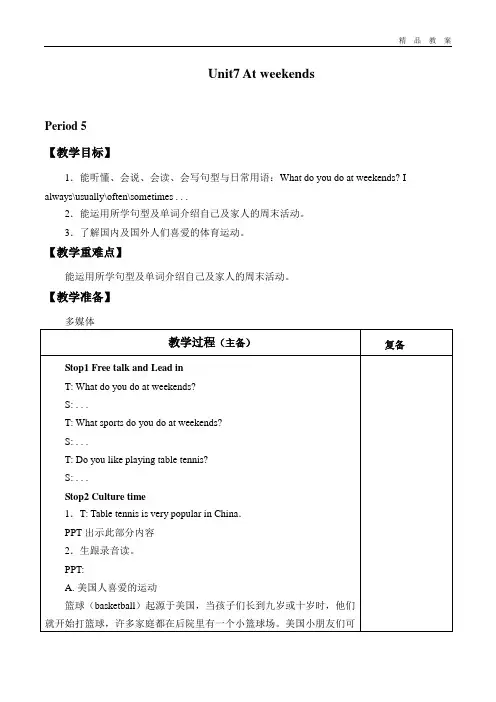
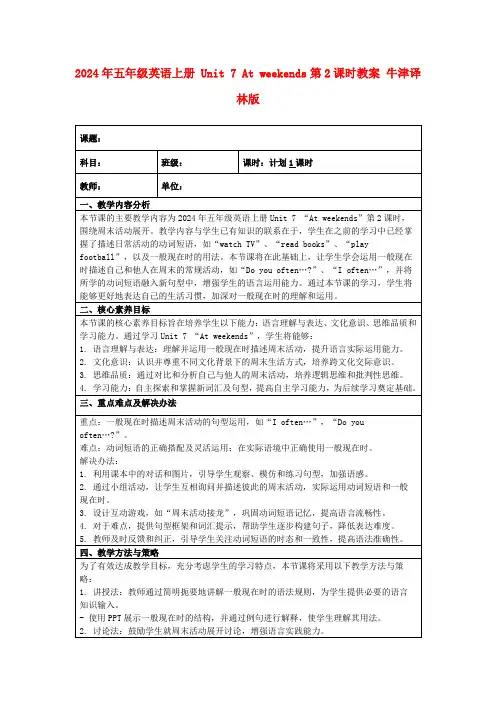
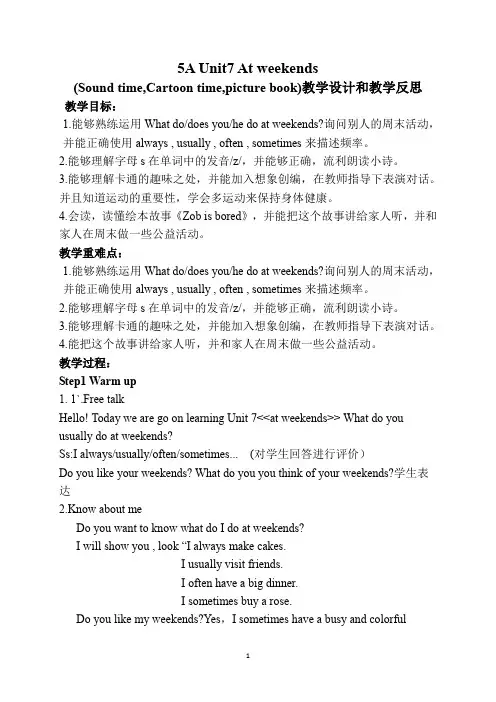
5A Unit7 At weekends(Sound time,Cartoon time,picture book)教学设计和教学反思教学目标:1.能够熟练运用What do/does you/he do at weekends?询问别人的周末活动,并能正确使用always , usually , often , sometimes来描述频率。
2.能够理解字母s在单词中的发音/z/,并能够正确,流利朗读小诗。
3.能够理解卡通的趣味之处,并能加入想象创编,在教师指导下表演对话。
并且知道运动的重要性,学会多运动来保持身体健康。
4.会读,读懂绘本故事《Zob is bored》,并能把这个故事讲给家人听,并和家人在周末做一些公益活动。
教学重难点:1.能够熟练运用What do/does you/he do at weekends?询问别人的周末活动,并能正确使用always , usually , often , sometimes来描述频率。
2.能够理解字母s在单词中的发音/z/,并能够正确,流利朗读小诗。
3.能够理解卡通的趣味之处,并能加入想象创编,在教师指导下表演对话。
4.能把这个故事讲给家人听,并和家人在周末做一些公益活动。
教学过程:Step1 Warm up1. 1`.Free talkHello! Today we are go on learning Unit 7<<at weekends>> What do you usually do at weekends?Ss:I always/usually/often/sometimes... (对学生回答进行评价)Do you like your weekends? What do you you think of your weekends?学生表达2.Know about meDo you want to know what do I do at weekends?I will show you , look “I always make cakes.I usually visit friends.I often have a big dinner.I sometimes buy a rose.Do you like my weekends?Yes,I sometimes have a busy and colorfulweekends.Step 2. Sound time(1.)Mr. Rose.Sometimes, I buy a rose at weekends. Do you like the rose? It’s so lovely!Here’s a big garden. There are many roses in it? Are they lovely?Ss: Yes!The garden belongs to a man. He likes roses too, Do you know who is he?------Mr. Rose!(2.)What does Mr.Rose do at weekends?-------Let’s visit Mr. Rose!(3.)Read and thinkRead after tape. Read by themselves,read in teamsDo you like Mr Rose’s weekends,why?------beautiful,lovely...Look at these red letters, what is the pronunciation of s here?/z/(4.)Say more wordsRead these words,do they pronounce/z/ Ss: /s/(5)Put right words into the sentence. Who is he? 导入到cartoon time 的BillyStep 3. Cartoon time(1.)Watch and answerNow you can watch a cartoon of Billy’s weekends and tell me Do you like Billy’s weekends?why? He always watches TV and eats a lot.(2.)What about Bobby and Sam? Do you like their weekends? Why?(3.) Let’s read(4.)Whose weekends do you like better? Why?Why don’t you like Billy’s weekends?It’s unhealthy and lazy. And Billy becomes fatter and fatter. So at last,(放录音)教学get out让学生模仿读(5.) Suggestions for Billy(6)Let’s act动作,表情,道具(7)we should do sports to keep fit.提升Step 4. Picture bookHere’s a new friend. He is Zob. let’s have a look at his weekend.(1.) What do you know from the cover??What to you want to know about the story?Let the students ask some questions.(2.) Why is Zob bored?Read the story by yourself quickly.快速读故事,找出答案If you have some new words,遇到不会的单词ask your parteners or ask me.问问同桌或者老师。
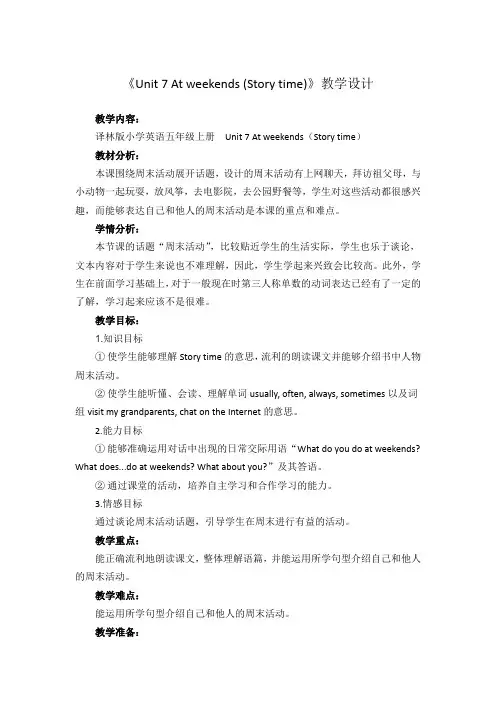
《Unit 7 At weekends (Story time)》教学设计教学内容:译林版小学英语五年级上册Unit 7 At weekends(Story time)教材分析:本课围绕周末活动展开话题,设计的周末活动有上网聊天,拜访祖父母,与小动物一起玩耍,放风筝,去电影院,去公园野餐等,学生对这些活动都很感兴趣,而能够表达自己和他人的周末活动是本课的重点和难点。
学情分析:本节课的话题“周末活动”,比较贴近学生的生活实际,学生也乐于谈论,文本内容对于学生来说也不难理解,因此,学生学起来兴致会比较高。
此外,学生在前面学习基础上,对于一般现在时第三人称单数的动词表达已经有了一定的了解,学习起来应该不是很难。
教学目标:1.知识目标①使学生能够理解Story time的意思,流利的朗读课文并能够介绍书中人物周末活动。
②使学生能听懂、会读、理解单词usually, often, always, sometimes以及词组visit my grandparents, chat on the Internet的意思。
2.能力目标①能够准确运用对话中出现的日常交际用语“What do you do at weekends? What does...do at weekends? What about you?”及其答语。
②通过课堂的活动,培养自主学习和合作学习的能力。
3.情感目标通过谈论周末活动话题,引导学生在周末进行有益的活动。
教学重点:能正确流利地朗读课文,整体理解语篇,并能运用所学句型介绍自己和他人的周末活动。
教学难点:能运用所学句型介绍自己和他人的周末活动。
教学准备:人物头像,单词卡片,教学多媒体教学流程:一.预习质疑自助建构1.Let me read. 试着读出新词组。
2.Let me try. 试着小组内利用新词组编Chant或者歌谣。
【设计意图】学生在自主预习单的指导下进行课前的自助学习,通过各种方式学习新单词,这样不但为新课的学习做好了铺垫,还培养了学生的自主学习能力。
教案:Unit 7 At Weekends教学目标:1. 能够听懂、会说、会读本单元的生词和重点句子。
2. 能够运用所学知识描述自己和他人的周末活动。
3. 培养学生的英语口语表达能力,提高学生的英语学习兴趣。
教学内容:1. 学习本单元的生词和重点句子。
2. 学习描述周末活动的表达方式。
3. 进行课堂交流和实践活动。
教学重点与难点:1. 重点:本单元的生词和重点句子,描述周末活动的表达方式。
2. 难点:能够正确运用所学知识进行课堂交流和实践活动。
教具与学具准备:1. 教师准备PPT或者黑板,用于展示本节课的内容。
2. 学生准备课本、练习本、文具等学习用品。
教学过程:Step 1: 热身(5分钟)1. 教师与学生进行简单的英语交流,询问学生上周的周末活动。
2. 学生用英语回答问题,激发学生的学习兴趣。
Step 2: 呈现与学习(15分钟)1. 教师通过PPT或者黑板,展示本节课的生词和重点句子。
2. 教师引导学生跟读生词和句子,确保学生能够正确发音。
3. 教师举例说明如何运用所学知识描述周末活动。
Step 3: 课堂交流与实践活动(10分钟)1. 教师组织学生进行小组活动,学生互相询问周末活动,并用英语进行交流。
2. 教师选取几位学生进行课堂展示,分享他们的周末活动。
3. 教师给予评价和指导,帮助学生提高口语表达能力。
Step 4: 作业布置(5分钟)1. 教师布置作业,要求学生运用所学知识,写一篇关于自己周末活动的短文。
板书设计:1. 板书本节课的“Unit 7 At Weekends”。
2. 板书生词和重点句子,方便学生复习和巩固。
作业设计:1. 作业要求学生运用所学知识,写一篇关于自己周末活动的短文。
2. 作业要求学生正确拼写单词,正确使用语法,句子通顺。
课后反思:1. 教师对本节课的教学效果进行反思,找出优点和不足之处。
2. 教师根据学生的课堂表现和作业完成情况,调整教学策略,为下一节课做好准备。
5A Unit 7 At weekends(第 3 课时 )教课内容:五年级上册Culture time cartoon time and checkout time教课目的:1.理解 cartoon time 中的故事情节并能正确朗诵。
2.能够运用所学的句型和单词讨论自己和朋友的周末活动。
3.知道运动有益于身体健康,能建立主动参加体育运动的意识。
4.三会掌握词组 get out、come out。
5.认识不一样的体育项目风靡不一样的国家。
教课要点:1.理解 cartoon time中的故事情节并能正确朗诵。
2.能够运用所学的句型和单词讨论自己和朋友的周末活动。
教课难点:1.能够运用所学的句型和单词讨论自己和朋友的周末活动。
2.知道运动有益于身体健康,能建立主动参加体育运动的意识。
教课过程:Step1 Greetings and review1.Good morning, boys and girls. What day is it today? What date is it today? How is the weather? Sit down, please.st lesson we learned about unit 7 at weekends. Can you introduce their weekends?3.What do you think about their weekends?Ss: Their weekends are...4.Their weekends wonderful. How about your weekends? Say something about your weekends, please.What does he/she do at weekends? He/She...What do you think about his/her weekends? His/Her weekends are...Step 3 Culture time1.Here are three boys. They show their weekends tous. Read by yourself, then tell us which boy is Jack/Tom/Binbin .3. Where do they live?Jack lives in the UK.Football is very popular in the UK.Tom lives in the US.Basketball is very popular in the US.Binbin lives in China.Table tennis is very popular in China.Step4 Cartoon time1. How are Billy’ sekwends? Watch and think.2. What do you think about Billy’ s weekends?It’unhealthy. Why?Billy always watches TV and always eats a lot.3.What do Sam and Bobby do at weekends?Read and answer.4.What else do they do, please imagine.Perhaps they5.Sam and Bobby usually do some sports at weekends. But Billy alwayswatches TV. And always eats a lot. So he is too fat. What can Bobby and Sam sayto Billy?3.Read the story(1) Read after the cartoon(2) Read in three(3) Act the storyStep5 Checkout time1. This lesson, we talked about Mike and his friends’ weekends, our weekends, talked about three boys’weekends, we also talked about Billy, Sam and Bobby’ s weekends. Now let’ s write a passage about weekends, about this lesson.2.Read and write.2. Ask some students to read their composition.教课反省:本节课是第三课时,主要学习内容是culture time、cartoon time and checkout time 中的 think and write。
音、视频为一体的flash,增强了语言教学的可视性,激发了学生参与课堂的热情。
10.教学反思与改进
Grammar time & Fun time ----- 这一课的主要内容是学习用句型"What do you/they do at weekends? What does she do at weekends?”"I/they/she/he often/usually/always/sometimes..."谈论自己或家人、朋友的周末活动,这些知识在我们的日常生活中非常常见。
因此在学习时,让学生通过谈论自己身边的人的周末活动来进行学习会让学生更容易地掌握所学知识。
在整个教学过程中,练习的内容不要局限性,教师可根据学生已学的知识情况,利用图片,对练习内容进行拓展。
但值得注意的是,拓展的内容应与本单元教学重难点相扣,并与生活实际紧密联系。
此外,我们还要实现语言从课内到课外的延伸,充分利用学校、家庭和社会等教育资源,开展综合性学习活动,拓宽学生的学习空间,增加学生英语实践的时间与机会。
教师在教学中应围绕语言点,尽可能创设真实的交际情景,或者给一些提示语,增强语言实践的真实感,充分体现“以学生为中心”的教学理念。
教师应设计有效的课堂教学活动,采用“先听说,后读写;先整体,后局部”的方法,引导学生进行发散思维,最大限度的发挥学生的主体性。
教师应在训练学生听说技能的同时,培养学生灵活掌握知识,自然真实地进行交际的能力。
Unit 7 At weekends.教案【教学内容】:译林英语五年级上册Unit7 At weekends (Grammar time and Fun time)【教材简析】:本单元谈论的话题是周末活动,教师可以和学生一起复习有关课外活动和业余爱好的词汇,作为导入或巩固活动。
涉及的周末活动有上网和远方家人聊天、放风筝、看电影、野餐等,教师可以在教学中利用挂图、照片或多媒体呈现一些孩子周末活动的情景,进行教学。
【教学目标】:1. 能复述课文中四个人物的周末活动,正确使用动词的第三人称单数形式。
2. 熟练运用本单元的重点句型What do / does … do at weekends?的第二、三人称单复数形式。
3. 掌握四个频率副词的用法。
4. 归纳本单元新出现动词的第三人称单数形式【教学重点】:1.句型:What do you do at weekends? I always\usually\often\sometimes . . .的使用。
2. 词汇:always,usually,often和sometimes频率副词的区别及正确用法。
【教学难点】:根据所描述的对象正确运用句型。
【教学准备】:多媒体课件【教学过程】:Step 1 . Warming up1. Greetings2. Free talkWhat do you usually do at weekends?Step 2. Revision1. 师生问答,复习课文T: What does Su Hai do at weekends?S1: She usually visit her grandparents.S2: She and Su Yang like playing with their cat Kitty.S3: They often have dinner with their grandparents at weekends.T: Does Mike visit his grandparents at weekends?Ss: No, he doesn’t. His grandparents live in UK. He usually chats with them on the Internet at weekends.T: What does Helen do at weekends?S4: She always has dancing lessons.S5: She sometimes goes to the cinema with her friends.T: What about Mike? What does he do at weekends?S6: He usually plays football with Liu Tao.S7: He sometimes goes to the park with his family.S8: They usually fly a kite and have a picnic there.2. 复述课文中四个人物的周末活动。
Unit 7 At the weekends 教案教学设计1教学目标:新课程强调知识与技能,过程与方法,情感态度与价值三个角度的有机结合,本着这样的认识,我对本课设计了如下的教学目标:1.情感目标: 通过活动,游戏,儿歌等形式让学生产生学习英语的兴趣,让学生在老师创设的氛围中敢于,乐于,善于开口讲英语,积极参与交流,树立学好英语的信心。
并通过谈论自己的周末生活,体会生活的美好,从而更加的热爱和珍惜现在的美好的生活。
2.认知目标:(1)掌握对话中出现的词组,如chat on the Internet,fly a kite,go to the cinema,havea picnic等。
(2 )句型:What do you do at weekends? I often…What does he /she do at weekends?He / She often …(3)能模仿对话的语音语调,理解并熟练的朗读对话,读音准确。
3.能力目标:能运用所学的句型,结合对话中出现和以前学过的动词词组,用英语进行生活交际,了解同学和佳人的平时活动。
通过调查让学生体会合作的重要性,并能用所学的知识解决一些实际的问题。
教学重点:学生能运用句型What do you do at weekends?What does he/ she do at weekends? 结合词组进行口语交际,注意动词第三人称单数的用法。
教学难点:1. 单词picnic的发音以及其复数形式。
2. 第一人称到第三人称的转化。
3. 根据所学的知识完成有关的练习。
教学策略:新课程强调从学生的学习兴趣,生活经验和认识水平出发,倡导体验,时间,参与,合作与交流的学习方式和任务型的教学途径达到发展学生对语言的综合运用能力。
为了达到教学目标,落实教学重点,难点,本堂课我借助多媒体复习以前学过的动词词组,借助一些事物,如塑封的蝴蝶等,激发学生的兴趣,同时也为下节课昆虫的教学打下基础。
【优质】小学英语译林牛津版五年级上册《Atweekends》优质公开课教案《At weekends》教案课题Unit7 At weekends教学目标1. Learn the vocabulary: rose, grow, get out.2. Learn the phonetic of the letter “s”.3. Learn the patterns: Let’s go …. He/She ……s/es ….4. Train Ss enjoy the great fun of this cartoon story.教学重点难点1. Learn the vocabulary: rose, grow, get out.2. Learn the phonetic of the letter “s”.3. Learn the patterns: Let’s go …. He/She ……s/es ….教学方法谈话教学法教学步骤教师活动学生活动Step1 Warming-up Greetings and free talk. Greetings and freetalk.Listen and write somesentences.Listen and write. Check the answers. Check the answers.Step2 Look at the pictures. Look at thePresentationpictures.Listen to the tape. Listen to the tape. Find the same letter “s”. Find the same letter“s”.Say the phonetic /z/ of theletter “s”.Say the phonetic/z/.Teach the new words:rose-roses, grow-growsLearn the new words:rose-roses,grow-growsRead the short text. Read the short text. Act the short text. Act the short text. Find the other words. Find the other words.Do some exercises. Do some exercises. Check the answers: Check the answers. T: Look at the pictures, whoare they?S: They’re Billy,Sam and Bobby.T: What are they doing? Watchthe cartoon, please.Watch the cartoon.Ask, answer and fill theforms:Ask, answer andfill.Billy-watch TV, eat a lot, don’t like playing。
【最新整理,下载后即可编辑】Unit7 At weekends单元教材分析:本单元谈论的话题是周末活动,教师可以结合学生用书四年级下册Unit2 After school和五年级上册unit4 Hobbies的内容,综合呈现语言知识。
教师可以和学生一起复习有关课外活动和业余爱好的词汇,作为导入或巩固活动。
涉及的周末活动有上网和远方家人聊天、放风筝、看电影、野餐等,教师可以在教学中利用挂图、照片或多媒体呈现一些孩子周末活动的情景,也可以要求学生课前准备一张家庭周末活动的照片。
教学目标:1. 能听懂、会说、会读单词:at weekends, grandparents, play with, very much, chat, Internet, go to the cinema, a lot, come out, get out.2. 能听懂、会说、会读、会写单词:visit, often, always, sometimes, there.3. 能听懂、会说、会读、会写句型与日常用语:What do you do at weekends? I always\usually\often\sometimes . . .4. 能熟练运用本单元所学句型及频率副词谈论周末活动。
5. 知道字母s在单词中的读音。
教学重点:1. 句型:What do you do at weekends? I always\usually\often\sometimes . . .2. 词汇:at weekends, grandparents, play with, very much, chat, Internet, go to the cinema, a lot, come out, get out.3. 语音:字母s在单词中的读音。
教学难点:1. 句型:What do you do at weekends? I always\usually\often\sometimes . . .的使用。
2. 词汇:always,usually,often和sometimes频率副词的区别及正确用法。
3. 语音:字母s在单词中的读音。
课时安排:第1课时:Story time (text, Look and write)第2课时:Checkout time, Fun time第3课时:Grammar time第4课时:Cartoon time, Sound time第5课时:Culture time, Ticking time第6课时:Ticking time (review, exercise)第一课时教学目标:1.理解、掌握对话内容,能用正确的语音语调朗读对话,并初步表演对话。
2.能正确运用日常交际用语:What do you do at weekends? I always\usually\often\sometimes . . .3.能听懂、会说、会读单词:at weekends, grandparents, play with, very much, chat, Internet, go to the cinema, a lot, come out, get out.教学重难点:1.能正确理解对话内容,朗读对话,初步表演对话。
2.能听懂、会说、会读单词:at weekends, grandparents, play with, very much, chat, Internet, go to the cinema, a lot, come out, get out.教具准备:教学目标:1. 复习上节课所学的词汇和故事。
2.能听懂、会说、会读、会写句型与日常用语:What do you do at weekends?I always\usually\often\sometimes . . .教学重难点:1.能正确运用频率副词。
2.能用正确的语音语调正确的朗读对话,复述故事。
教具准备:第三课时教学目标:1.能听懂、会说、会读、会写句型与日常用语:What do you do at weekends?I always\usually\often\sometimes . . .2.正确运用频率副词。
3.掌握do 和does 的用法及第三人称单数形式的变化规则教学重难点:do 和does 的用法及第三人称单数形式的变化规则教学准备:第四课时教学目标:1.欣赏Cartoon time复习巩固所学句型。
2.能用正确的语言语调朗读对话,在熟读的基础上分角色朗读。
3.了解字母s在单词中的读音。
教学重难点:能用正确的语言语调朗读对话。
教具准备:第五课时教学目标:1.能听懂、会说、会读、会写句型与日常用语:What do you do at weekends?I always\usually\often\sometimes . . .2.能运用所学句型及单词介绍自己及家人的周末活动。
3.了解国内及国外人们喜爱的体育运动。
教学重难点:能运用所学句型及单词介绍自己及家人的周末活动。
教学准备:第6课时Ticking time(review , exercise)教学目标:进行一些练习,让学生对于本课更加清楚,并能够熟练掌握本课单词和句型。
教学重难点:熟练运用本课单词和句型并能够在实际情境中熟练运用。
教学准备:试卷听力部分(30分)一、听录音,选出你所听到的单词。
(5分)()1. A. . listen B . lesson C . let ( ) 2. A . so B. two C . too( ) 3. A. why B. way C. always ( ) 4. A. with B . which C. each ( ) 5. A. sports B. sport C.spend二、听录音,用数字给下列句子排序。
(5分)()What do they do at weekends ?( ) We often chat on the Internet at weekends.( ) What about you , Mike?( ) Sometimes I also go to the cinema.( ) We like singing and dancing.三、听录音,选择正确的答语。
(10分)()1. A. Yes , I do . B. Yes, we can . C. Yes, we do.( ) 2.A. Yes , I do . B. No, I can’t. C. Yes, I like.( ) 3.A. He likes swimming. B.She often swims. C.She can swim.( ) 4.A. Yes, you’re right. B. That’s right. C. OK.( ) 5. A. Yes , he does. B. Yes, she does . C. Yes, she is.四、听录音,补全短文。
(10分)Mike is a Chinese boy. Mike likes 1.__________. At weekends, he often 2.___________ football 3.___________ his friends in the playground. Sometimes he goes climbing or swimming. Sometimes he4.________________ goes to the5.______________. He likes goingthere. He likes cartoon movies because they’re interesting.笔试部分(70分)五、英汉互译。
(20分)1.在周末___________________2. 去看电影_____________________3.喜欢聊天___________________4. 非常____________________5.出来___________________6. in China_____________________7.listen to music ______________ 8. my family_____________________9.dancing lessons___________________ 10. play tabletennis__________________六、单项选择。
(10分)()1.----What ______ they do at ___________ weekends ?.---- They often go skating.A.do; themB. do ; theirC. does ; their( ) 2. I often go to the park ________ my parents .A. andB. withC. take( ) 3. We like ________ and ________ .A. sing ; danceB. sings ; dancesC. singing ; dancing( ) 4. Helen ________ likes ________ books.A. too ; readB. also ; readC. also ; reading( ) 5. Mike ________ four lessons ________ Tuesday.A. have ; onB. has ; onC. has ; in( ) 6. Shall we _________ to the cinema now ?A. goingB. goesC. go( ) 7. ___________ go to the party now ?A. Shall weB. Let’sC. Can we( ) 8. Can you _________ basketball ?A. playB. playingC. to play( ) 9. Billy always ________ dinner ________ his family .A. have ; andB. has ; withC. eat ; and( ) 10. Helen’s friend often ________ swimm ing .A. goB. goesC. going七、情景配对。
(10分)( ) 1..Do you like sports ? A. Yes , he does.( ) 2. What does your sister do at her weekends? B. They watch films.( ) 3. Do your parents go to the zoo with you ? C. He flies a kite.( ) 4.Shall we sing and dance now ? D. She is a writer.( ) 5.What is your hobby ? E. He likes playing football.( ) 6.What do your parents do at weekends ? F. I like swimming .( ) 7.What does his father do at weekends ? G. OK.( ) 8.What does he like doing ? H. She often swims.( ) 9. What does she do ? I. No, I don’t .( )10.Does he have any flowers ? J. No, they don’t.八、按要求改写句子。